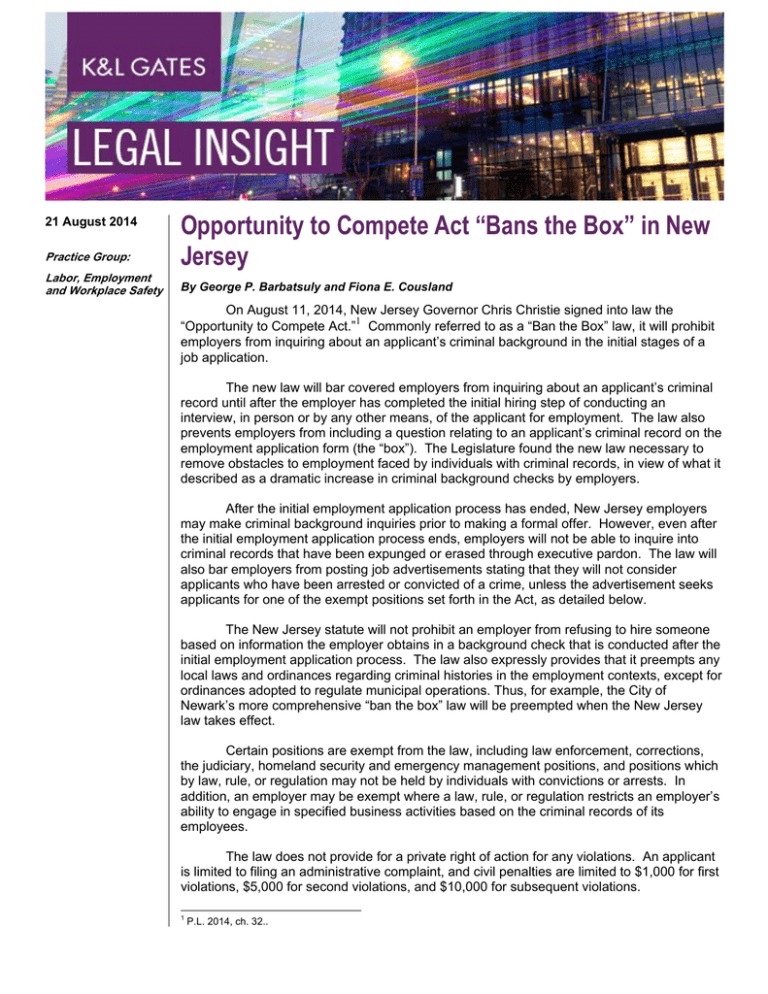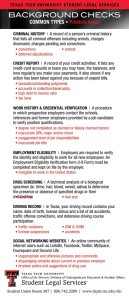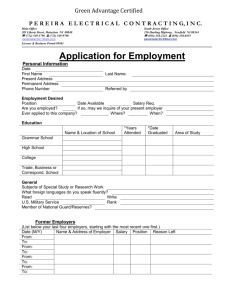
21 August 2014
Practice Group:
Labor, Employment
and Workplace Safety
Opportunity to Compete Act “Bans the Box” in New
Jersey
By George P. Barbatsuly and Fiona E. Cousland
On August 11, 2014, New Jersey Governor Chris Christie signed into law the
1
“Opportunity to Compete Act.” Commonly referred to as a “Ban the Box” law, it will prohibit
employers from inquiring about an applicant’s criminal background in the initial stages of a
job application.
The new law will bar covered employers from inquiring about an applicant’s criminal
record until after the employer has completed the initial hiring step of conducting an
interview, in person or by any other means, of the applicant for employment. The law also
prevents employers from including a question relating to an applicant’s criminal record on the
employment application form (the “box”). The Legislature found the new law necessary to
remove obstacles to employment faced by individuals with criminal records, in view of what it
described as a dramatic increase in criminal background checks by employers.
After the initial employment application process has ended, New Jersey employers
may make criminal background inquiries prior to making a formal offer. However, even after
the initial employment application process ends, employers will not be able to inquire into
criminal records that have been expunged or erased through executive pardon. The law will
also bar employers from posting job advertisements stating that they will not consider
applicants who have been arrested or convicted of a crime, unless the advertisement seeks
applicants for one of the exempt positions set forth in the Act, as detailed below.
The New Jersey statute will not prohibit an employer from refusing to hire someone
based on information the employer obtains in a background check that is conducted after the
initial employment application process. The law also expressly provides that it preempts any
local laws and ordinances regarding criminal histories in the employment contexts, except for
ordinances adopted to regulate municipal operations. Thus, for example, the City of
Newark’s more comprehensive “ban the box” law will be preempted when the New Jersey
law takes effect.
Certain positions are exempt from the law, including law enforcement, corrections,
the judiciary, homeland security and emergency management positions, and positions which
by law, rule, or regulation may not be held by individuals with convictions or arrests. In
addition, an employer may be exempt where a law, rule, or regulation restricts an employer’s
ability to engage in specified business activities based on the criminal records of its
employees.
The law does not provide for a private right of action for any violations. An applicant
is limited to filing an administrative complaint, and civil penalties are limited to $1,000 for first
violations, $5,000 for second violations, and $10,000 for subsequent violations.
1
P.L. 2014, ch. 32..
Opportunity to Compete Act “Bans the Box” in New Jersey
New Jersey joins many states, counties, and municipalities that have passed “ban
the box” and similar laws restricting the ability of employers to consider the criminal histories
of job applicants. Hawaii, Illinois, Massachusetts, Minnesota, New York, and Rhode Island
have laws that apply to private employers. California, Colorado, Connecticut, Maryland, New
Mexico, and the District of Columbia have laws that apply only to public employers. More
than forty cities have similar legislation, and employers should be careful to check the state
and municipal laws applicable to them.
In particular, New York City prohibits city agencies and some contractors from
inquiring about an applicant’s criminal history on an initial job application or during an initial
interview, and limits consideration of an applicant’s criminal history to felony convictions,
unsealed misdemeanor convictions, and pending charges. Proposed legislation in New York
City (the “Fair Chance Act”) would expand the prohibition to all employers and impose
additional requirements upon employers, including requiring a written report on the decision
not to hire an applicant based on a criminal history, which the applicant could then contest.
New Jersey’s new law goes into effect March 1, 2015. It applies to employers with
15 or more employees over 20 calendar weeks who do business, employ persons, or take
applications for employment within the state of New Jersey, including job placement and
referral agencies. It is limited to employment which is in whole, or in substantial part, within
New Jersey.
Authors:
George P. Barbatsuly
george.barbatsuly@klgates.com
+1.973.848.4104
Fiona E. Cousland
fiona.cousland@klgates.com
+1.973.848.4038
Anchorage Austin Beijing Berlin Boston Brisbane Brussels Charleston Charlotte Chicago Dallas Doha Dubai Fort Worth Frankfurt
Harrisburg Hong Kong Houston London Los Angeles Melbourne Miami Milan Moscow Newark New York Orange County Palo Alto Paris
Perth Pittsburgh Portland Raleigh Research Triangle Park San Diego San Francisco São Paulo Seattle Seoul Shanghai Singapore Spokane
Sydney Taipei Tokyo Warsaw Washington, D.C. Wilmington
K&L Gates practices out of 48 fully integrated offices located in the United States, Asia, Australia, Europe, the Middle East and South
America and represents leading global corporations, growth and middle-market companies, capital markets participants and
entrepreneurs in every major industry group as well as public sector entities, educational institutions, philanthropic organizations and
individuals. For more information about K&L Gates or its locations, practices and registrations, visit www.klgates.com.
This publication is for informational purposes and does not contain or convey legal advice. The information herein should not be used or relied upon in
regard to any particular facts or circumstances without first consulting a lawyer.
©2014 K&L Gates LLP. All Rights Reserved.
2



